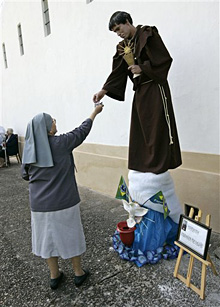 |
 |
 |
 News from Around the Americas | May 2007 News from Around the Americas | May 2007  
Pope Benedict XVI Heads to Brazil on First Pilgrimage to Latin America
 Victor L. Simpson - Associated Press Victor L. Simpson - Associated Press


| | Warley Costa, 29, right, depicts Antonio de Sant'Anna Galvao, known as Friar Galvao, at the Luz Monastery in Sao Paulo, Tuesday, May 8, 2007. Pope Benedict XVI will canonize Galvao, an 18th century Franciscan, during his visit to Brazil May 9-13. (AP/Silvia Izquierdo) |
Vatican City — Pope Benedict XVI departed Wednesday on his first pilgrimage to Latin America — a test of the 80-year-old pontiff's stamina and how he intends to deal with pressing challenges to his church in the region.

The Vatican is promising he will deliver a tough message to politicians on poverty and crime during the five-day visit to Brazil — the world's most populous Roman Catholic country — as well as try to strengthen a church battling to retain its leading role in the region.

The German-born pope plans to lay out his strategy when he opens a once-a-decade meeting of bishops from throughout Latin America in the shrine city of Aparecida, near Sao Paulo, Brazil, South America's largest city.

The Vatican's No. 2 official said Benedict will issue a "strong message" on poverty, social inequality, drug trafficking and violence and on the exodus of Catholics joining Protestant evangelical churches.

"We hope these messages are heard, not only in the Catholic communities but by the political class," Cardinal Tarcisio Bertone, the Vatican's secretary of state, told reporters.

Benedict's predecessor, John Paul II, visited Mexico and addressed Latin American bishops just three months after assuming the papacy. Benedict has waited two years for his first trip to a region where nearly half the world's 1.1 billion Catholics live.

The Vatican recently defended the pope, saying he was as concerned about poverty in the developing world as much as his predecessors. "It's not true that he's 'Eurocentric' as some claim," said Vatican spokesman the Rev. Federico Lombardi.

Benedict, who visited Brazil as then-Cardinal Joseph Ratzinger in 1990, will celebrate several open-air Masses including a canonization ceremony for Brazil's first native-born saint, and visit a church-run drug and alcohol rehabilitation center.

But the focus will be on countering secular trends, such as the recent legalization of abortion in Mexico City, as well as the growing influence of evangelical Protestant groups, which the Vatican considers "sects" but have attracted millions of Latin American Catholics in recent years.

In Brazil, many are torn between the church's traditional teachings and the pressures of the modern world — with abortion at the forefront. The procedure is illegal in Brazil except in cases of rape or when the mother's life is in danger.

On Tuesday, some 5,000 people — both Catholics and Protestants — held an anti-abortion march in the capital of Brasilia ahead of the pope's visit.

President Luiz Inacio Lula da Silva will meet with the pope in Sao Paulo, but a spokesman told reporters the center-left leader does not plan to bring up abortion or other sensitive issues such as a government anti-AIDS program that distributes millions of condoms each year.

The pope will also face some opposition from within the Brazilian church, where liberation theology — which links spiritual growth to human rights — is still active among thousands of groups working with poor and landless communities.

As John Paul's close aide, then-Cardinal Ratzinger, Benedict led a campaign against what the Vatican considers a Marxist-inspired movement. The Vatican set the tone for Benedict's trip by censuring the Rev. Jon Sobrino, a prominent champion of liberation theology in the region, and condemning some of his works as "erroneous or dangerous."

Despite inroads by evangelical groups and the legalization of abortion in Mexico's capital, Vatican officials say the church's scorecard in Latin America is not entirely bleak.

A study released in Brazil this week indicated the flight from the Catholic church stabilized from 2000 to 2003, even though the ranks of Protestants continued to grow.

On abortion, the Vatican points to countries such as Nicaragua which last year banned the procedure in all cases.

The May 9-14 pilgrimage will be Benedict's first lengthy trip as pope.

Although he appears healthy and has never missed a scheduled event, he said in an interview last year that "I've never felt strong enough to plan many long trips."

Except for a stop in Turkey, Benedict's travels have been confined to Europe. The only other trip scheduled this year is to nearby Austria. | 
 | |
 |



